AIChE Fall 2022
The University of Iowa
Editor: Margaret Praska
Advisor’s Corner By: Prof. David Murhammer, Professor and AIChE Student Chapter Advisor
Inside this issue:
AIChE National Conference
Fall Mentor/Mentee Program Update
Greetings to Hawkeye Chemical Engineers!! First, the Fall 2022 issue of our AIChE Student Chapter Newsletter contains an article about our students’ attendance at the 2022 AIChE annual student conference in Phoenix, Arizona. Second, there is an article about our chapter’s new K-12 Program involving working with teachers at a local elementary school to conduct science experiments with their students. Third, there is an article highlighting the new professor in our department Matthew McGill. Fourth, there is an article about Anthony Wagner’s summer internship at BASF in Malcolm, Iowa. Fifth, there is an article about Margaret Praska’s undergraduate research experience. Sixth, the final article in this issue discusses our student-run mentor/mentee program.
A few comments about the 2022 AIChE Annual Student Conference. Anthony Wagner was awarded the 2022-23 AIChE Donald F. Mildred Topp Othmer National Scholarship Award. This is the 25th time that a University of Iowa Student has won this prestigious award since 1991. Note that only 15 students receive this award annually among the ~190 student chapters in the United States. Furthermore, the University of Iowa received a 2021-22 Outstanding Student Chapter award for the 18th consecutive year (longest active streak in the United States) and for the 29th time in the last 30 years. This award is only given to the top 10% of student chapters in the United States. Finally, the University of Iowa (UI) ChemE Jeopardy team finished second in the national competition. The team consisting of Nolan Burson, Kevin Dial, Marie Ohlinger and Anthony Shirazi led going into final jeopardy. The final jeopardy clue was “This thermally-resistant bacterium is the model organism used to design sys-tems for the heat sterilization of growth media.” The correct response is “What is Bacillus stearothermophilus?” The University of Maryland Baltimore County (UMBC) won the competition by providing the correct final jeopardy response. The University of Iowa’s response was “What is Bacillus thermophilus?” – close but not correct. The final score was UMBC 5900, UI 5700 and University of Southern California (USC) 2000 (USC did not come close to the correct final jeopardy response). Note that the UMBC finished second to the UI teams in the 2020 and 2021 competitions and therefore was very excited to finally beat us. The UI has won this competition four times and have now finished second four times during the 12 years of the competition. No other school has won more than once.
Any comments about the newsletter should be sent to me at david-murhammer@uiowa.edu.
AIChE National Conference Overview
Olivia Clark
Fourteen undergraduate students attended the 2022 National American Institute of Chemical Engineers Student Conference from November 11th-14th in Phoenix, AZ. Students packed their checked bags and carry-ons to depart from the chilly Hawkeye State. Greeted by sunny skies and cacti, students checked into their hotel and explored downtown Phoenix. Several university chapters hosted student-led workshops on the evening of Friday the 11th. One workshop, titled “Mentoring Programs” was held by UI undergraduates Anthony Wagner, Nick Brunn, and me. We introduced how we organize our peer mentor and alumni mentor programs and shared our experiences with both. After the workshops, the graduating seniors had a great time at a networking mixer made specially for them!
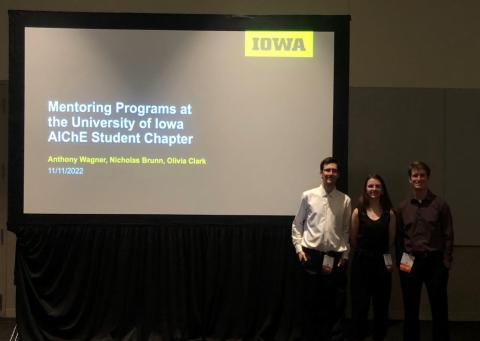
Mentoring Workshop: (L-R) Nick Brunn, Olivia Clark, and Anthony Wagner.
The next day, students were welcomed by a breakfast and keynote address in the convention center. After, a large portion of the day was devoted to career workshops, which were offered on a variety of topics including graduate school, industry, leadership, financial planning, and sustainability. Following the workshops was the ChemE Car Safety Inspection and Poster Competition, as well as the ChemE Jeopardy Semi-Finals. Comprised of May 2022 graduates Nolan Burson, Kevin Dial, and Anthony Shirazi and current senior Marie Ohlinger, the ChemE Jeopardy team competed for the University of Iowa. They won their Semi Final game against Georgia Institute of Technology and Auburn University to advance to the Finals!
Sunday was filled with more excitement, as there was the 2022 Recruitment Fair where students networked with companies and graduate schools, more workshops, and the Student Awards Ceremony. The UI AIChE chapter won the 2021-2022 Outstanding Student Chapter Award, and Anthony Wagner won the 2022 Donald F. & Mildred Topp Othmer Scholarship Award. Congratulations, all! The eventful day ended with the ChemE Jeopardy Finals, where the University of Iowa placed 2nd while competing against the University of Maryland, Baltimore County and the University of Southern California. The University of Iowa kept a steady lead until Final Jeopardy where UMBC came out on top.
The conference finished on Monday the 14th with the Student Poster Presentation Competition. Students learned about research happening at the many other universities that attended the conference and cheered on the 7 UI undergraduates who presented their fascinating research posters. After an incredible conference full of learning, networking, and new experiences, the group travelled back to Iowa. Many are already excited to attend the next student AIChE conference, the Mid-America Regionals, in Spring 2023!
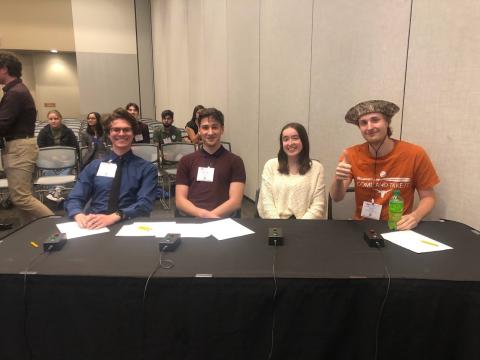
The University of Iowa ChemE Jeopardy team: (L-R) Nolan Burson, Anthony Shirazi, Marie Ohlinger, and Kevin Dial.
K-12 Program Update
Eleanor Lopez
The University of Iowa’s chapter of American Institute of Chemical Engineers typically hosts a kids’ day camp once a semester, where kids will come for a full day of science experiments, STEM activities, learning and fun. This year, we set a goal to expand our K-12 program into something more! With guidance from the national AIChE team and colleagues at Ohio State University, our AIChE chapter is growing a K-12 STEM Outreach program that involves partnering with local schools to deliver fun and engaging science experiments and lessons to complement their curriculum!
In the Fall 2022 semester, Morgan Ellerman and Eleanor Lopez served as K-12 Coordinators, a revised role on the board aiming to set up partnerships and get the program running. President Anthony Wagner put in a lot of work to obtain necessary trainings and supplies to run the program. After reaching out to schools, a partnership with Longfellow Elementary has been set up with Andrew Stratton’s sixth grade science classes, and under the supervision of Patrick Snyder. The students are currently studying chemical interactions for the second half of the school year, so it was a perfect opportunity for us to share our knowledge and experiential learning with them!
In early December, K-12 ambassadors joined the classes for the first time to make “goofy putty,” a fun polymer slime made from borax and Elmer’s glue. A short lesson on chemical mixtures and solutions, polymers, and chemical reactions was taught before kids got to make their own goofy putty to take home. The kids chose their own colors for the slime and mixed the ingredients themselves, and a lot of cool creations were made! They all had a great time, and both the students and ambassadors look forward to doing more experiments in the coming months.
In spring of 2023, Eleanor Lopez, Savannah Barnes and Katelyn Weber will serve as K-12 coordinators for the chapter and will continue performing experiments with Longfellow elementary students and expand the program further. We are excited to help kids find a passion for science and learning!
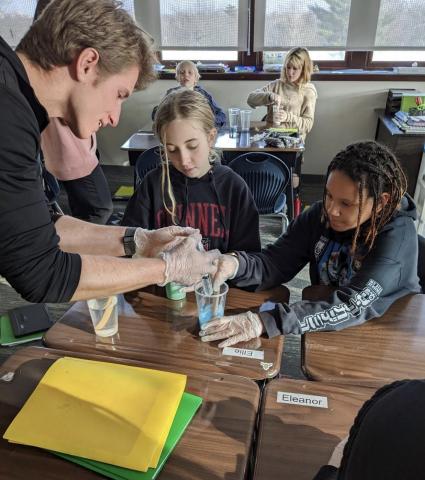
UI AIChE Student Chapter President Anthony Wagner Leading Group Activity at Longfellow Elementary
New Faculty Spotlight
Kiana Resch
Iowa, we’ve got a new professor!
Back in August, we were excited to welcome Dr. Matthew McGill to the department! He grew up in rural Michigan. For his undergrad he studied physics at a small town college in Michigan, but then he went to the University of Michigan where he graduated with his doctorate in Atmospheric Science in 1996. As a grad student, he worked using lidar remote sensing to demonstrate wind measurements. After he graduated, he started working at NASA’s Goddard Space Flight Center’s Earth Sciences Division in Greenbelt, MD. He had a myriad of roles the 26 years he worked there. His latest role was being the Deputy Director of Earth Sciences. There he helped build instruments for planetary science. He was able to help build prototype instruments for aircraft. His favorite part of NASA was being able to peruse technology developments that would not have been possible at other places. Dr. McGill was ready for a change of pace when he came to the University of Iowa.
When asked what he was most excited for being at Iowa, he said the community here. He is excited to work together with the faculty and students. Dr. McGill also looks forward to the short commute. He was 25 miles away from work at Goddard and it usually took a minimum of 45 minutes to get there. He also mentioned that it is nice having short lines at the grocery store! It's easy to say it is quite different here in Iowa. He is also excited to setup labs and focus on bringing hardware back. Dr. McGill is working on setting up his lab for the upcoming semester. When speaking to Dr. McGill, he kept mentioning the importance of scigineers. A scigineer is able to bridge the gap between scientists and engineers. It is important that engineers are able to properly interpret the data that is collected from their experiments. He wants to emphasize the importance of this here at Iowa. At NASA, they could not hire enough people with these skills. As a chemical engineer, dimensionless numbers are important and show up in many different topics from heat and mass transfer to fluid flow to chemical reaction engineering. When asked what his favorite was, he simply could not because all of them are fun since they are dimensionless. A proper interview is not complete without asking for some words of wisdom, which Dr. McGill was excited to share. He encourages everyone to have an interest out of work or school. For him, he loves trains. It helps create a work/life balance that everyone needs. In the case that what you are doing is not working, Dr. McGill encourages people to not feel locked in and to try something new, as you never know what is out there. He hopes that anyone who is interested in building hardware or in atmospheric science to reach out to him! He cannot wait to see what is in store for his chapter here at Iowa. We are so excited to have Dr. McGill here at Iowa! Let’s all give him a warm Iowa welcome!
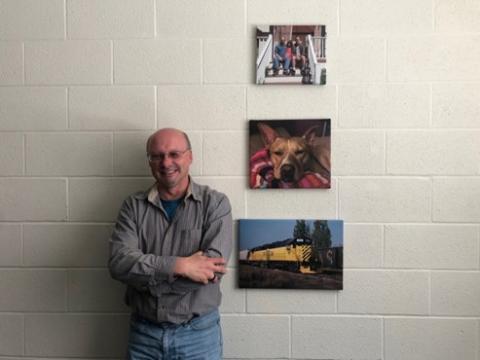
New Faculty Member Dr. Matthew McGill
Internship with BASF
Anthony Wagner
My name is Anthony Wagner, and I am a 4th year chemical engineering student. My most recent internship was with BASF, and I would highly recommend the company to anyone seeking an internship for the upcoming summer.
My internship with BASF was an extremely valuable experience in my life that I was able to learn a lot from. I was the Operation Engineer Intern at the Malcom, IA site in the summer of 2022. The Malcom BASF site specializes in producing cast elastomer polyurethane solutions and polyester polyols. It is a relatively small site compared to some of the other BASF sites in the world, but I think that contributed to my positive experience. Working at a site of this size, I was able to personally know all of the employees from engineering and maintenance to administration and operations. They do a great job of fostering a family environment where everyone wants to help others succeed.
As the Operations Engineer Intern, I was able to lead a wide variety of projects, mainly focused on improving the efficiency and safety of operations. For example, I led a project from start to finish which basically rerouted some waste drain lines from the reactor and distillation column to make their waste draining procedure after each batch much more efficient and safer for the operators. Some of the major tasks involved with this project were completing a management of change (MOC), working with maintenance to develop new piping isometrics, working with operators to update the operating procedure, updating documents such as piping and instrumentation diagrams (P&IDs), and leading the pre-startup safety review (PSSR) at the end of the project. This was a fulfilling project for me since I was able to see it to completion in the short time I spent with BASF, and I was able to hear positive feedback from the operators about how it improved the quality of their daily tasks. Another major project that I worked on was a Lean Six Sigma project using the DILO (Day In the Life Of) method to identify value-added and non-value-added tasks completed by operators. For this project, I shadowed operators during their shifts and tracked each of the tasks they completed throughout the day and the time it took to complete them. I also tracked their movement throughout the plant and the site. Compiling the data after doing this for a week, we were able to identify outlying non-value-added time which often represented a form of waste in the process. The project allowed us to suggest multiple process and procedural changes that would improve efficiency and minimize waste, and it was also a great opportunity for me to get to know the operators better and understand the process from their point of view.
I think the main takeaway that I had from this internship is that having a strong relationship and respect between engineers and operators is an important part of successfully operating a manufacturing facility. Operators may not always know all of the science and math behind why something works the way it does, but they work with it every single day and know the process better than anyone. Engineers should always be able to think from the perspective of the operators when making process changes and respect the input given by them. I enjoyed being able to develop these relationships throughout my internship, and this experience is what convinced me that I want to work in chemical manufacturing after graduation. I’m excited to be able to use all of the knowledge and experience I got from working for BASF in my future career.
Plant Trip to Emerson
Hadley Mosby
One of the requirements for Professional Seminar this semester was participating in a plant trip. Over the semester, plant trips at Emerson (Fisher Controls), International Flavors and Fragrances, Quaker Oats, and UI Pharmaceuticals Sterile Product Manufacturing were coordinated. The first plant trip was at Emerson (Fisher Controls) on September 1st, 2022. At 8:30 am, about 50 students boarded a bus at the Seamans Center and headed to Marshalltown, Iowa for the tour, which began at the Emerson Innovation Center.
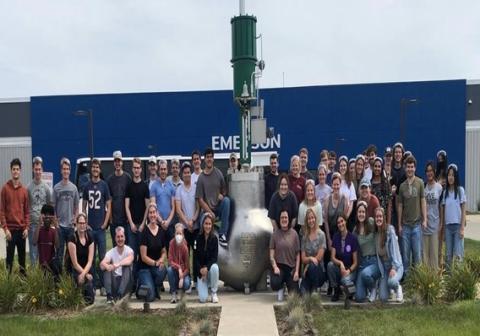
University of Iowa students participating in the Emerson plant trip in Marshalltown, Iowa
At the Innovation Center, we were given proper PPE and a handbook on control valves. We then toured the facility and were able to see their state-of-the-art flow lab. After the tour, we ate lunch and participated in a question-and-answer session with engineers and business team members. In the Q&A session, we learned about the different opportunities at Emerson and got tips for applying to jobs and internships. We finished the day at one of the manufacturing sites in Marshalltown. There we got to see how control valves are manufactured and assembled. The plant trip at Emerson was a great learning opportunity, and taught us about careers after undergrad!
Undergraduate Research
Margaret Praska
I have had the pleasure of working in Dr. Wang’s atmospheric and environmental science research lab since the summer of 2021. My research focuses on the sensing of natural emissions, particularly soil NOx. To do this research, I utilize high performance computing in python.
My research focuses on nitrogen oxides (NOx) because it plays a crucial role in tropospheric chemistry. NOx influences the oxidizing capacity of the troposphere by reacting with hydroxyl radicals (OH) and then catalyzing the formation of ozone (O3). My research focuses specifically on the natural emission of soil NOx to determine if the puff of NOx emitted from the soil is visible by using SMAP, Sentinel 5 and GPM satellite data. Methods of research began first with creating plots of SMAP (Soil Moisture Active Passive) soil moisture data, TROPOMI (TROPOspheric Monitoring Instrument) NO2 data, and GPM (Global Precipitation Measurement) precipitation data for the month of July in 2018 over a specified midwestern United States region. These plots indicated that certain days when there is a rain event, both the soil moisture content and amount of NO2 increased. In order to improve analysis accuracy, the TROPOMI dataset and SMAP dataset have to be in the same spatial resolution to be able to make comparisons at the same pixel level. This was then achieved by regridding the TROPOMI dataset to a standardized grid and then subsetting the SMAP dataset to extract data of interest. As another attempt to improve analysis accuracy, a correlation plot was then created to verify the study region. This correlation plot revealed that it is better to study NO2 in smaller regions and that time series are needed to study how these smaller regions are correlated.
With guidance from Dr. Wang and assistant research scientist, Lorena Castro, I was able to submit an abstract to the AIChE student poster competition at the National Conference that was held in Phoenix. My abstract was confirmed, and I took part in the poster competition! It was a great experience where I was able to present my research to fellow chemical engineers and gain valuable presenting experience.
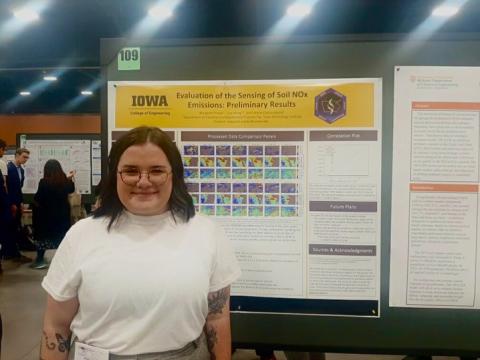
Margaret Praska Presenting at the Student Poster Competition at the AIChE National Conference
Mentor/Mentee Program Fall Semester Update
Nicholas Brunn
The University of Iowa’s chapter of the American Institute of Chemical Engineers (AIChE) has a mentorship program that allows our underclassmen to receive guidance and advice from their more experienced upperclassmen in the chemical engineering department. Juniors and Seniors are paired with one or more Freshmen and Sophomores based on criteria such as research and career interests as well as focus area. The mentors meet with their mentees several times a semester to provide support and help with any areas where their mentees are struggling. It is common for mentors to help with schedule planning, preparing for interviews or job searches, or just adjusting to life at the university.
This has been my second and final semester as the Vice President and manager of the program. During this time, I have been fortunate to witness sophomores start as mentees and develop into junior mentors thanks to the wisdom they have gained over a year of their studies and through programs such as ours.
The beauty of the Mentor-Mentee Program is that it allows the participants to expand their networks and abilities. The mentees can meet regularly with older chemical engineering students who often have invaluable connections and experience. Mentees can learn the secret tips and tricks to thrive in this major from people who have survived all of the challenges they have faced. The mentors also benefit greatly from this partnership. Meeting with and assisting a mentee allows the mentor to experience a leadership role, where they can guide others in their decision making process, something they will undoubtedly use in their careers as chemical engineers. Furthermore, interacting with a mentee allows the mentor to learn about someone who likely has a different perspective, background, or mindset, and doing so can enrich their student experience and teach valuable lessons about teamwork and leadership. Control over the frequency, duration, and topic of these meetings is left up to the mentees, so they can get as much out of the program as they desire. Some mentees love to meet up with their mentors as often as possible, while others prefer to meet only one or two times a semester, so the flexibility of the program allows every mentee to cater to their own specific needs.
To help support our mentors and mentees, AIChE organizes social events to allow students to meet and interact not just with their mentors/mentees, but also with other chemical engineers in and out of their grade level in a fun and engaging setting. In the past, we have had Mentor-Mentee events where students have been able to play games, compete in laser tag, and engage in creative projects.
The first event this semester was group painting a la Bob Ross. Students were able to meet up shortly after the pairings were made and meet each other in a casual environment. Students were free to forget their classwork for a few hours and paint something beautiful in the company of others. This helped them to destress and flex their creativity. For many of the younger students, this was also their first chance to hang out with their fellow ChemE’s in a nonacademic setting.
We also had an event late in the semester where students were invited to take a break from finals studying and join us in a casual game night. This event, while not as popular as the painting, was a chance for students to interact more directly by playing competitive and cooperative games. Events like this allow students to strategize and work together in avenues outside of academics while also giving them a much needed reprieve from the demands of chemical engineering.
The Mentor-Mentee program is all about getting students together to support each other, provide guidance, and expand personal and professional networks. For that reason, I am proud to be part of such an organization that can do so much to support chemical engineering students. As the semester comes to an end, so too does the program. But come Spring, the program will start again under the guidance of a new vice president. Students will be free to keep the pairings they had before or forge new ones, and I, for one, am excited to see how the program and the students continue to develop.
Follow us on Linked in
Attention Alumni
There is now an IOWA Chemical Engineering Alumni LinkedIn page for you to join!
Its called AIChE at the University of Iowa.
Check it out for more frequent IOWA ChemE news, we would love to see you there!
Acknowledgments
Thank you to the AIChE Officers for their hard work and contributing efforts to make our AIChE Student Chapter a successful organization.
President: Anthony Wagner
Vice President: Nicholas Brunn
Secretary: Maddie Haase
Treasurer: Braden Jensen
Newsletter Editor: Margaret Praska
Webmaster: Kiana Resch
Historian: Olivia Clark
Social Chair: Jakob Kindle
ChemE Car Chairs: Darrell Smith and Zach Thomas
K-12 Program Coordinators: Eleanor Lopez and Morgan Ellerman
Volunteer Chair: Olivia Dohm
Advisor: Professor David Murhammer
Editor-In-Chief Margaret Praska would also like to thank the following people for their support and contributions to the Fall 2022 AIChE Student Chapter Newsletter:
Faculty Advisor: Professor David Murhammer
Contributors: Olivia Clark, Eleanor Lopez, Kiana Resch, Anthony Wagner, Hadley Mosby, and Nicholas Brunn
Your help is much appreciated!
Interested in speaking at professional seminar? If so, then contact our Spring 2023 AIChE Student Chapter Vice President Braden Jensen at braden-t-jensen@uiowa.edu or Student Chapter Advisor Prof. David Murhammer at david-murhammer@uiowa.edu for details and availability!